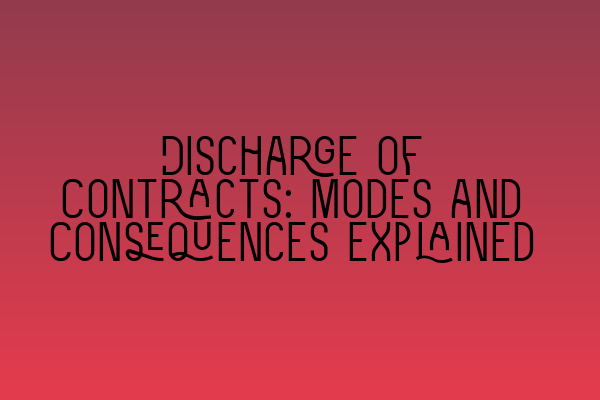Discharge of Contracts: Modes and Consequences Explained
In the world of contract law, parties enter into agreements every day to fulfill mutual obligations. But what happens when those obligations are fulfilled or when circumstances change? That’s where the concept of contract discharge comes into play. In this comprehensive blog post, we will delve deep into the various modes of contract discharge and the consequences that follow. So, whether you are a business owner, a legal professional, or simply curious about contract law, read on to gain a clearer understanding of this crucial topic.
1. Introduction to Contract Discharge
Contract discharge refers to the termination of contractual obligations, freeing both parties from further obligations. A contract can be discharged in several ways, including performance, agreement, frustration, breach, or operation of law. Each mode has its own unique consequences, which we will explore in detail.
2. Discharge by Performance
The most common way to discharge a contract is through performance. When both parties fulfill their respective obligations as agreed upon in the contract, the contract is considered discharged. For example, if you hire a contractor to build a house and they complete the construction according to the specifications, the contract is discharged.
3. Discharge by Agreement
Sometimes, parties may mutually agree to terminate a contract before it is fully performed. Such an agreement can be reached orally or in writing, and it is essential to clearly outline the terms of termination to avoid any future disputes. The consequences of discharge by agreement may include the payment of damages or the return of any consideration received.
4. Discharge by Frustration
In certain circumstances, events beyond the control of either party can make it impossible to fulfill the contract. This is known as frustration. When frustration occurs, the contract may be discharged automatically. For instance, if a concert venue is destroyed by a fire, it would be impossible for the performer to fulfill their obligation, leading to discharge by frustration.
5. Discharge by Breach
When one party fails to fulfill their obligations under the contract without a valid excuse, it is considered a breach of contract. A breach can occur through non-performance, defective performance, or anticipatory breach. In such cases, the innocent party may choose to discharge the contract and seek legal remedies for the breach, such as damages or specific performance.
6. Discharge by Operation of Law
There are certain legal rules that automatically discharge a contract without the need for any action by either party. These rules are called discharge by operation of law. Examples include the expiration of the contract’s term, the death of a party, or the destruction of the subject matter of the contract. It is important to understand these rules to ensure proper contract management.
7. Consequences of Contract Discharge
The consequences of contract discharge vary depending on the mode of discharge. In cases of discharge by performance or agreement, both parties are relieved of their obligations, and the contract comes to an end. However, discharge by breach may result in the innocent party seeking remedies for the breach. Discharge by frustration often results in the parties being discharged from future obligations, but they may still be liable for obligations that arose before the frustrating event.
8. Conclusion
Understanding the various modes of contract discharge is vital for anyone involved in contractual agreements. Whether you are a business owner, a legal professional, or a party entering into a contract, having a clear understanding of the ways in which a contract can be discharged allows you to navigate potentially difficult situations. By familiarizing yourself with the consequences of contract discharge, you can protect your rights and interests in any contractual relationship.
Remember, when it comes to contracts, it is always wise to consult with a qualified solicitor to ensure that your rights are protected and that you are aware of all possible avenues for contract discharge. If you require further information or professional assistance regarding contract law, do not hesitate to reach out to SQE Contract Law for expert guidance.
